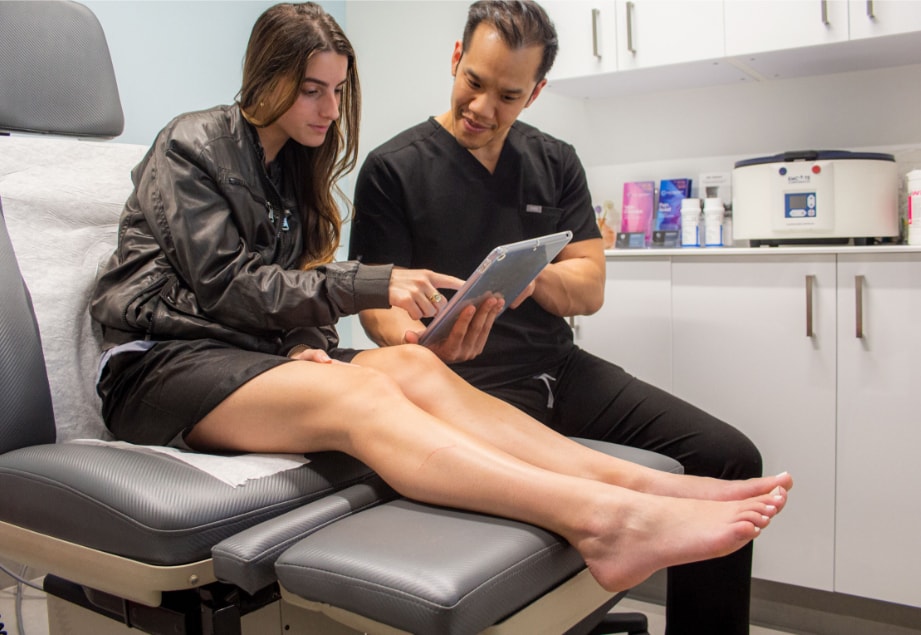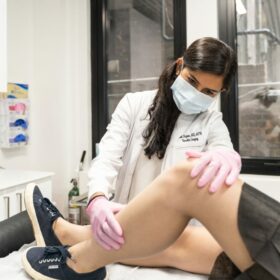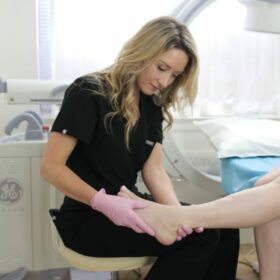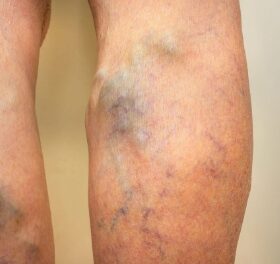What are the causes of heavy and tired legs?
There are many potential causes of heaviness in the legs, ranging from simple issues like dehydration to more serious problems like venous insufficiency. If you experience heavy and tired legs, you must contact a board-certified vein doctor near your location. Leg heaviness, leg swelling, and restless leg syndrome can be signs and symptoms of a dangerous circulatory disorder, so you must contact a vein doctor without delay.
Vein Treatment Clinic is a group of state-of-the-art vein clinics specializing in minimally invasive spider vein and varicose vein treatments. Our vein clinics are led by board-certified vein doctors who carefully diagnose and treat the root cause of your vein problems — not just the visible signs. You can find our vein centers in Long Island, New York, New Jersey, and Maryland. If you’re in New Jersey, our vein doctors can be found in Woodland Park, Clifton, or Paramus.
Below, we describe seven possible causes of leg heaviness.
1. Overuse
Dehydration can cause fatigue and heaviness in the legs, especially if you’ve been sweating or not getting enough fluids throughout the day. Drink plenty of water and other fluids to stay hydrated, and if you’re sweating a lot, be sure to replenish electrolytes with sports drinks.
2. Poor Circulation
Poor circulation can cause the legs to feel heavy, achy, and tired. This is often due to sitting or standing in one position for too long, which can cause the muscles to tighten and the blood to pool in the legs. Try to move around frequently to improve circulation.
3. Venous insufficiency
Venous insufficiency is when the veins have difficulty returning blood to the heart. This can cause the legs to feel heavy, achy, and tired. If you have venous insufficiency, your doctor may recommend wearing compression stockings to help improve circulation. However, the only way to treat chronic venous insufficiency is with minimally invasive vein treatments, so you must contact board-certified vein doctors who can diagnose and treat vein disease.
4. Muscle Fatigue
Muscle fatigue is a common cause of heaviness in the legs. This can be due to overexertion or simply not getting enough rest. If your legs feel especially heavy after workouts, give yourself time to rest and recover.
5. Varicose Veins
Varicose veins are a common cause of leg heaviness and discomfort. These are enlarged veins that can be seen under the skin. While they are usually always dangerous, they can be painful and worsen over time. Furthermore, varicose veins often indicate advanced chronic venous insufficiency, so you must contact vein doctors for treatment.
6. Lymphedema
Lymphedema is a condition in which the lymphatic system cannot properly drain bodily fluids. This can cause the legs to swell and feel heavy. If your doctor determines that your leg heaviness is caused by lymphedema, they’ll curate a personalized treatment plan.
7. Medications
Certain medications can also cause leg heaviness. These include diuretics, antihistamines, and antidepressants. Talk to your doctor if you’re taking any of these medications and experiencing leg heaviness. They may be able to adjust your dosage or switch you to a different medication.
How do I know if my heavy and tired legs are caused by chronic venous insufficiency?
Your leg veins have valves that open and close to help blood flow to your heart. When these valves don’t work properly, blood can leak back into your legs and pool. This is called venous insufficiency, which can cause your legs to feel heavy and tired. There are a few other signs and symptoms that could point to venous insufficiency:
- Aching or throbbing in your legs
- Swollen ankles or feet
- Itchy skin on your legs
- Cramping in your legs
- Restless Legs Syndrome
- Skin changes, such as dryness, thinning, or ulcers
If you’re experiencing any of these symptoms, especially if they’re severe or getting worse over time, it’s important to see a vein doctor. Vein doctors can determine whether venous insufficiency is the cause and develop a treatment plan to help you find relief.
How is lipedema diagnosed?
Lipedema is often misdiagnosed as obesity, but it is a distinct condition that affects the fat cells and lymphatic system. Lipedema typically occurs in women and is characterized by excessive fat deposits on the thighs, buttocks, and lower legs. The condition is often bilateral, affecting both sides of the body equally.
If your doctor suspects you have lipedema, they may recommend further testing, such as a blood test or a biopsy. A blood test can help rule out other conditions with similar symptoms. A biopsy involves examining a small tissue sample from the affected area under a microscope. This can help confirm the diagnosis.
What are the best treatments for leg heaviness?
There are a variety of treatments available for leg heaviness. Some home remedies include wearing compression stockings, elevating the legs, and exercising regularly. More formal medical treatments include sclerotherapy and endovenous laser ablation.
- Compression stockings are one of the most common treatments for leg heaviness. They work by applying gentle pressure to the legs, which reduces swelling and improves circulation.
- Elevating the legs is another simple and effective treatment. This can be done by lying down and placing pillows under the legs. This helps to reduce swelling and ease leg heaviness.
- Exercising regularly is beneficial for treating leg heaviness. Exercise improves circulation and strengthens the muscles in the legs. Walking, swimming, and biking are good exercises.
- Sclerotherapy is a medical procedure that involves injecting a solution into the veins. This solution helps to collapse spider veins and improve circulation.
- Endovenous laser ablation is another medical procedure that uses laser energy to heat and destroy the diseased vein. This treatment is typically used for larger varicose veins and underlying chronic venous insufficiency.
Your vein doctor will carefully examine your leg veins, discuss your symptoms, administer ultrasound tests to visualize the blood flow in your leg veins, and curate a personalized vein treatment plan. If you have vein disease, your vein treatment plan will include procedures that improve overall blood circulation, such as radiofrequency ablation and laser ablation.











